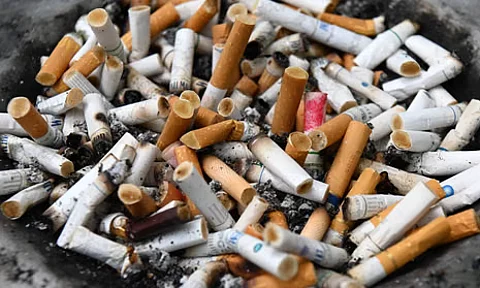

MARGAO:With tobacco use continuing to be a major public health challenge, key stakeholders from across Goa came together in Margao for a State Level Orientation Workshop aimed at tightening the fight against the deadly habit.
Organised by the District Tobacco Control Cell and the Directorate of Health Services in collaboration with Vital Strategies (New Delhi), the workshop sought to strengthen tobacco control measures in South Goa through awareness, coordination, and law enforcement.
Held at the Hospicio District Hospital Auditorium, the event drew around 60 officials representing a wide spectrum of government departments and agencies.
Among them were the Directorate of Education, Directorate of Transport, Department of Civil Supplies & Consumer Affairs, Directorate of Higher Education, Airport Authority of India, Department of Urban Development, Directorate of Panchayats, Kadamba Transport Corporation Limited (KTCL), Legal Metrology Department, Excise Department, Directorate of Food and Drugs Administration (DFDA), Konkan Railway Corporation Limited, Primary Health Centres, Goa Police and the Railway Protection Force.
Two law colleges—V M Salgaocar College of Law and Govind Ramnath Kare College of Law—also sent participants, reflecting the legal dimension of tobacco control.
The inaugural session was attended by Dr Amit Yadav, Deputy Director, Vital Strategies; Dr Rajendra Borkar, Medical Superintendent, SGDH; Dr Chaitali Manerkar, STCC Consultant (DHS); Roland Martins, Coordinator, GOACAN; and Vishal Gaonkar, Extension Educator, SGDH.
In the technical sessions, Dr Sarah George, District Nodal Officer, outlined the progress made under the National Tobacco Control Programme in South Goa, highlighting both achievements and areas requiring urgent attention. Dr Yadav delved into the legal framework for tobacco control, including the Cigarettes and Other Tobacco Products Act (COTPA) and the Prohibition of Electronic Cigarettes Act (PECA).
He also discussed the WHO Framework Convention on Tobacco Control (FCTC) and the MPOWER strategies, which provide a global blueprint for reducing tobacco use.
The workshop was not just about speeches. Delegates took part in spirited group discussions, brainstorming practical solutions for stronger enforcement and wider public awareness.
The session ended on a high note with a role play exercise, allowing participants to simulate real-world enforcement scenarios and community engagement methods.
By the close of the workshop, participants had drawn up a set of recommendations that organisers hope will translate into tangible actions against tobacco use in South Goa.